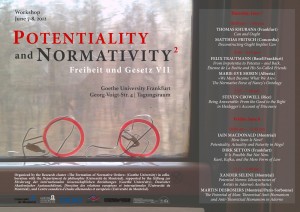Die Workshopreihe „Freiheit und Gesetz“ des Frankfurter Normative-Orders-Cluster geht in die nächste Runde und lädt am 7./8. Juni zu einem internationalen Workshop mit dem Titel „Potentiality and Normativity“. Der Flyer mit Programm und Details sowie eine ausführliche Beschreibung nach dem Klick!
POTENTIALITY AND NORMATIVITY
Part II: Frankfurt, June 7-8, 2012
This workshop series is dedicated to two related terms central to current
philosophical debates: “potentiality” and “normativity.” Bringing together
different discourses and approaches, the series aims to renew the question of how
“ought” and “can,” capacity and normativity, contingency and necessity relate to
each other.
A number of philosophical discussions in recent years—concerning, e.g., the
nature of rational capacities, the structure of sovereignty, the nature of an event—
have returned to the long tradition of philosophical debates on the relations of
priority or dependency between potentiality and actuality. Whereas Aristotle and
the subsequent tradition predominantly argued for an ontological, epistemological
and normative priority of actuality over possibility, a number of philosophical
approaches in the 20th century have claimed that this priority needs to be reversed.
“Higher than actuality stands possibility,” as Heidegger famously put it. The
workshop series addresses different attempts to treat the relation of actuality to
potentiality and to connect them to questions of normativity.
While the first workshop (Montréal, August 2011) took as its point of departure
current debates on potentiality (in Hegelianism, Neo-Aristotelianism,
Phenomenology, Psychoanalysis, Critical Theory, and Deconstruction), the
second workshop will approach the constellation and interrelation of potentiality
and normativity more from the side of normativity. It is a fundamental feature of
actions and history that we do not regard them under the aspect of mechanical
necessity but assess them in relation to normative laws that seem to imply the
possibility of their being different. What is ‘necessary’ or ‘lawful’ in existing
normative terms, then, could nevertheless be otherwise. The realm of the
normative is, as it were, a field of contingency. But how ought we to conceive of
the precise relation between normative necessity and contingency? And what
might the priority of possibility mean in relation to these? Does possibility precede
normativity genetically—in the sense that a space of possibilities has to be
established first in order to be regulated normatively—or does “ought” in some
sense bring forth its own “can”? Is the “can” of possibility already constituted by
the “ought” of normativity—to the extent that the possible appears as the
possibility of error, defect, or deviance? How does the potentiality of deviating
determinations affect the essential structure of existing normative determinations?
And is there a sense of potentiality (of, for instance, futurity or materiality) that
imposes upon us a different way of thinking of normativity—of the normative
transformation of normative relations? In order to address these questions, we
would like to engage a diversity of philosophical traditions and approaches that
might help to elucidate the ways in which potentiality and normativity depend,
condition—and perhaps are in tension with each other.
